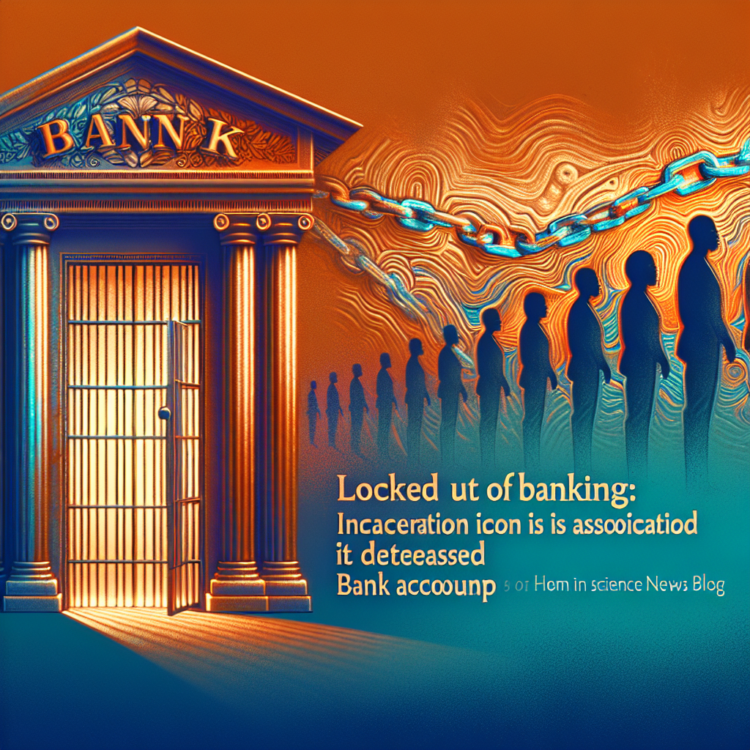People who have served time in jail or prison are less likely to have bank accounts after they are released than they were before serving time, which may hinder their long-term financial security, according to new research.
“Locked out of banking: The limits of financial inclusion for formerly incarcerated individuals” was authored by Brielle Bryan, an assistant professor of sociology at Rice University and J. Michael Collins, a professor of public affairs and human ecology and the Fetzer Family Chair in Consumer and Personal Finance at the University of Wisconsin-Madison. It is one of the first studies examining how incarceration status changes banking access.
“Financial inclusion has become a big concern globally when thinking about how to eradicate poverty and promote opportunity among the most marginalized members of society,” Bryan said. “With this study, we wanted to turn that lens toward formerly incarcerated Americans, who we know are among the most marginalized in America today.”
The researchers found that overall, bank account ownership decreased significantly after incarceration, and women and Hispanic individuals were more likely to lose access to banking following incarceration compared to other groups. The researchers also found that those who were able to maintain bank accounts while incarcerated were disproportionately white and had higher levels of education.
“Our study cannot say exactly why incarceration appears to reduce bank account access, but we have a few theories,” Bryan said. “We don’t think it has to do with lack of trust in banks among people with criminal justice system contact, because we don’t find that pretrial detention or arrests reduce bank account ownership.”
Instead, Bryan said it’s more likely to do with barriers to establishing an account that might seem minor to the general population, like providing an unexpired form of government identification or proof of residence in your own name.
“These sorts of small barriers can lead to big disadvantages for formerly incarcerated Americans,” Bryan said. “We know the alternatives to traditional banking can be exploitative and expensive – services like payday lending and check cashing. So regardless of why exactly it is happening, it’s a huge problem.”
The authors said the study’s confirmation of this lack of banking access following incarceration is important, as the absence of financial inclusion among people who have served time may have a significant impact on their long-term economic security.
People who have served time in jail or prison are less likely to have bank accounts after they are released than they were before serving time, which may hinder their long-term financial security, according to new research.
“Locked out of banking: The limits of financial inclusion for formerly incarcerated individuals” was authored by Brielle Bryan, an assistant professor of sociology at Rice University and J. Michael Collins, a professor of public affairs and human ecology and the Fetzer Family Chair in Consumer and Personal Finance at the University of Wisconsin-Madison. It is one of the first studies examining how incarceration status changes banking access.
“Financial inclusion has become a big concern globally when thinking about how to eradicate poverty and promote opportunity among the most marginalized members of society,” Bryan said. “With this study, we wanted to turn that lens toward formerly incarcerated Americans, who we know are among the most marginalized in America today.”
The researchers found that overall, bank account ownership decreased significantly after incarceration, and women and Hispanic individuals were more likely to lose access to banking following incarceration compared to other groups. The researchers also found that those who were able to maintain bank accounts while incarcerated were disproportionately white and had higher levels of education.
“Our study cannot say exactly why incarceration appears to reduce bank account access, but we have a few theories,” Bryan said. “We don’t think it has to do with lack of trust in banks among people with criminal justice system contact, because we don’t find that pretrial detention or arrests reduce bank account ownership.”
Instead, Bryan said it’s more likely to do with barriers to establishing an account that might seem minor to the general population, like providing an unexpired form of government identification or proof of residence in your own name.
“These sorts of small barriers can lead to big disadvantages for formerly incarcerated Americans,” Bryan said. “We know the alternatives to traditional banking can be exploitative and expensive – services like payday lending and check cashing. So regardless of why exactly it is happening, it’s a huge problem.”
The authors said the study’s confirmation of this lack of banking access following incarceration is important, as the absence of financial inclusion among people who have served time may have a significant impact on their long-term economic security.
“Access to banking is important for anyone, but especially for someone attempting to get back on their feet after incarceration,” the authors wrote. “Banking access allows individuals to more easily save and access funds that can be used to pay security deposits, rent, utilities, parole fees, and other outstanding legal financial obligations. Moreover, having a bank account enables individuals to deposit or cash paychecks with greater ease and less expense than alternative financial services. Accordingly, being unbanked is likely a contributing factor for several of the hardships that formerly incarcerated people face in terms of housing, credit and debt, and building wealth.”
Bryan and Collins hope the research may lead to interventions that ease the transition of incarcerated individuals as they work to reacclimate into society and access banking, citing promising models like Hawaii’s efforts to link individuals on work release to checking and savings accounts.
The study, published in Social Science Research, was based on data from the National Longitudinal Survey of Youth. The paper is online here.
Journal
Social Science Research
Method of Research
Data/statistical analysis
Subject of Research
People
Article Title
Locked out of banking: The limits of financial inclusion for formerly incarcerated individuals
Article Publication Date
1-Aug-2024




